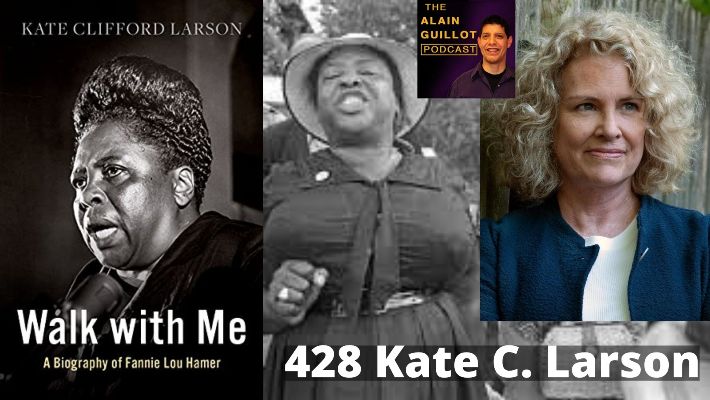About Kate Clifford Larson
Kate Clifford Larson is a bestselling author of critically acclaimed and award-winning biographies including,

Walk With Me: A Biography of Fannie Lou Hamer, which tells the remarkable story of one of America’s most important civil rights leaders of the 20th century;
Rosemary: The Hidden Kennedy Daughter; and Bound for the Promised Land: Harriet Tubman, Portrait of an American Hero.
A specialist in 19th and 20th century U.S. Women’s and African American History, Larson is also an award-winning consultant whose work includes feature film scripts – most recently Focus Features’ Harriet starring Cynthia Erivo – documentaries, museum exhibits, and public history initiatives including three Harriet Tubman state and national historical parks, and the Harriet Tubman Underground Railroad Byway and All-American Road.
She is frequently interviewed for national and international radio programs and media outlets and has appeared on national and international television broadcasts including BBC, PBS, and C-Span, cable networks, CBS Sunday Morning, and WGBH.
Larson is currently a Brandeis Women’s Studies Research Center Visiting Scholar. With two degrees from Simmons University, an MBA from Northeastern University, and a Doctorate in American History from the University of New Hampshire, Larson has nurtured a passion for researching and writing about American women’s lives.
She relishes the challenges of teasing out life stories from voices that have long been silenced. “I feel strongly that we must reconnect with the women who helped build and shape this country,” Larson recently wrote, “and by putting women at the center of the story, the world looks very different – more complex, interesting, and vibrant.”
And check out her website at www.katecliffordlarson.com for more information about her books, awards, reviews, and upcoming events, or follow her on Twitter.
Walk with Me: A Biography of Fannie Lou Hamer

She was born the 20th child in a family that had lived in the Mississippi Delta for generations, first as enslaved people and then as sharecroppers. She left school at 12 to pick cotton, as those before her had done, in a world in which white supremacy was an unassailable citadel.
She was subjected without her consent to an operation that deprived her of children. And she was denied the most basic of all rights in America the right to cast a ballot in a state in which Blacks constituted nearly half the population.
And so Fannie Lou Hamer lifted up her voice. Starting in the early 1960s and until her death in 1977, she was an irresistible force, not merely joining the swelling wave of change brought by civil rights but keeping it in motion. Working with the Student Non-Violent Coordinating Committee (SNCC), which recruited her to help with voter-registration drives, Hamer became a community organizer, women’s rights activist, and co-founder of the Mississippi Freedom Democratic Party.
She summoned and used what she had against the citadel her anger, her courage, her faith in the Bible, and her conviction that hearts could be won over and injustice overcome. She used her brutal beating at the hands of Mississippi police, an ordeal from which she never fully recovered, as the basis of a televised speech at the 1964 Democratic Convention, a speech that the mainstream party including its standard-bearer, President Lyndon Johnson tried to contain.
But Fannie Lou Hamer would not be held back. For those whose lives she touched and transformed, for those who heard and followed her voice, she was the embodiment of protest, perseverance, and, most of all, the potential for revolutionary change.
Kate Clifford Larson’s biography of Fannie Lou Hamer is the most complete ever written, drawing on recently declassified sources on both Hamer and the civil rights movement, including unredacted FBI and Department of Justice files. It also makes full use of interviews with Civil Rights activists conducted by the Smithsonian and the Library of Congress, and Democratic National Committee archives, in addition to extensive conversations with Hamer’s family and with those with whom she worked most closely. Stirring, immersive, and authoritative, Walk with Me does justice to Fannie Lou Hamer’s life, capturing in full the spirit, and the voice, that led the fight for freedom and equality in America at its critical moment.
